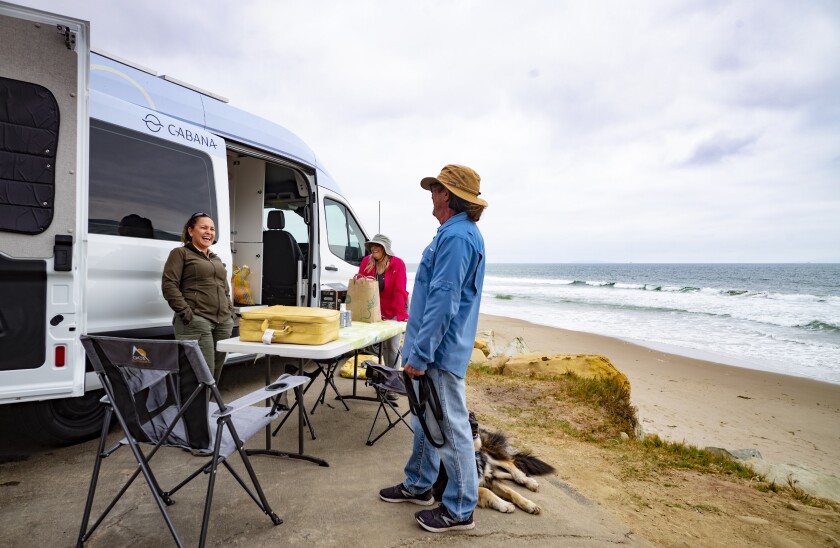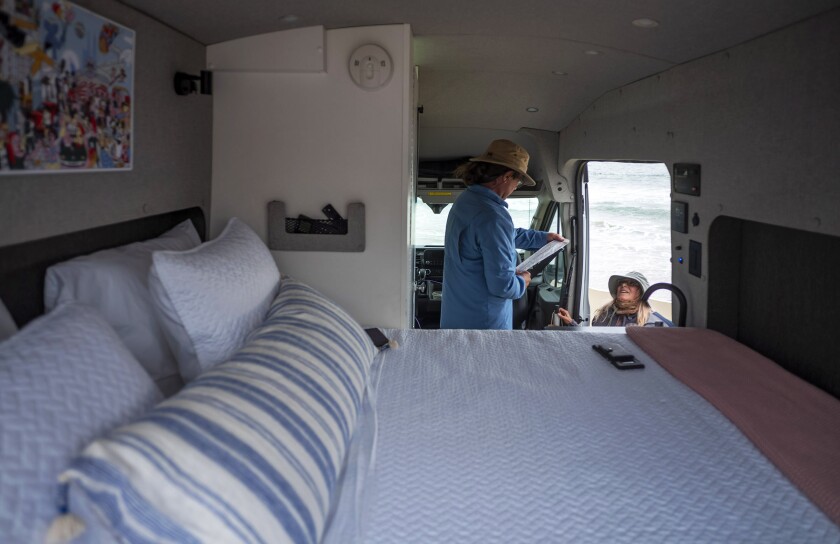What if you went on a road trip and never came back? Erik Zobler, a recording engineer and music producer, daydreams about doing just that. And he’s not alone. Zobler, of Porter Ranch, is one of an army of newbie vagabonds entranced by the #vanlife philosophy, which celebrates living full or part time in a vehicle, primarily a van.
The snowballing demand for vans — and recreational vehicles in general — can be traced in part to the COVID-19 pandemic and the desire to stay safe while traveling. Outdoorsy, an RV and camper van rental site, saw a 4,500% increase in bookings in the last year. The RV Industry Assn. estimates record sales of nearly 600,000 units in 2021, including vehicles as long as 50 feet.
Zobler doesn’t care about those RVs. Too big for someone who wants to commune with nature. He thinks he might be a van guy. His longtime partner, Jeri Palumbo, a broadcast sports audio engineer, agrees. But they don’t want to rough it.
They don’t have to: Innovators are continuously upping the #vanlife game. If you have deep pockets, bunking in a camper van can be a bit like staying in a five-star hotel on wheels.
The coolest camper vans, most of which are built on Mercedes Sprinter or Ford Transit chassis, are tricked out with $200,000 customizations that affluent travelers seek. These luxe vans, which range in length from 18 to 24 feet, come with showers, toilets, flat-screen TVs, queen-size mattresses, refrigerators and solar power.
Dozens of companies are popping up to rent or sell retrofitted sleeper vans, some with yearlong waiting lists. One popular choice is Benchmark, a Portland, Ore.-based company that advertises on its website, “We Build Your Escape.”
Jeri Palumbo sets up the camper van for the evening. Dinner is on the stove, in the foreground.
(Daniel A. Anderson)
Benchmark charges $120,000 to $350,000 to customize a van, said Erin Gilmore, the company’s director of operations. Add that to the cost of the van: $55,000 to $70,000.
“The people who buy our vans aren’t living in them; they’re using them like second homes,” she said.
Another conversion company, El Kapitan in Huntington Beach, builds custom vans in the $150,00 to $190,000 range. “A lot of celebrities and tech company CEOS have bought our vans,” said Brendan Kuhn, general manager. The company, like Benchmark, uses only Mercedes Sprinters and has been in business for three decades.
“People like the size of these vans,” Kuhn said. ”They can throw their surfboard or bike in the back and take off as soon as they leave work. It’s simple to operate. RVs aren’t.”
Want to try before you buy? A few companies and Airbnb-style marketplaces such as Outdoorsy and RVshare rent tricked-out vans.
Zobler was intrigued enough to try a rental recently. His last camping attempt with Palumbo was in Death Valley National Park, where they pitched an SUV tent. Too difficult to set up. Too primitive. So they contacted Cabana, a new van rental company with offices in Culver City and Seattle.

A ranger, left, visits with Jeri Palumbo, center, and Erik Zobler, who tried on the camper van lifestyle with a two-night trip.
(Daniel A. Anderson)
The company offers customized Ford Transit vans that cost from $189 to more than $300 a night, depending on the date. The couple set up a three-day trip to Ventura County, where they found a campsite at Rincon Parkway overlooking the beach.
I rented a Cabana van too ($189 a night) and met them there, as did photographer Daniel Anderson, who showed up in a camper van he had just bought — a Mercedes Sprinter Revel, a 4×4 modified by Winnebago.
“Can you think of a better way for a photojournalist to get to interesting places?” he asked, giving me a tour of the deluxe vehicle, which seriously outclassed my rental. He wouldn’t tell me how much it cost, but new models start at $175,000. His was a 2019. Among other things, he’d had it customized so he could shoot photos from its roof.
The four of us compared notes and agreed the vans are easy to drive. Picture yourself at the steering wheel of an Amazon Express truck, which is similar in size and shape. Visibility is a plus because the driver sits up high. I wouldn’t want to try to park it, but barring that, I was happy cruising north on the 101.
We pulled beach chairs from our vehicles (rentals come fully equipped) and sat in them watching the sea. Waves crashed 60 feet below us and pods of dolphins frolicked 250 feet offshore. I was happy to be here instead of in a hotel.
As the sun drifted lower in the sky, our new friends began to prepare dinner. The Cabana van offered a surprisingly large cooking area, with a two-burner stovetop that folded out from the back of the vehicle. Very efficient and easy to use. Zobler and Palumbo, who love to cook, impressed us with Chilean sea bass marinated in lemon and ginger, grilled asparagus and coleslaw with a peanut sauce.
After cleanup, we hustled back to our vans, all of which had flat-screen TVs. Roughing it can be such fun, especially when you’re not.
Other perks: Each van had a shower, toilet, plush queen-size mattress and enough storage to stash a suitcase so you don’t trip over it. There were also window shades; I closed them for privacy, jumped into bed and fell asleep that night to the sound of the surf.
Although there was sufficient space for my dog and me, I don’t think I’d be thrilled to share the limited area with another person. In the morning, I asked my fellow travelers how they had fared.

Jeri Palumbo and Erik Zobler’s Cabana van includes a bed and TV.
(Daniel A. Anderson)
“The Cabana van was 100% better than the SUV tent-camping experiment,” Palumbo said. “That tent was a pain in the neck to set up.” The couple also complimented the cushy bed, mini-kitchen and TV. “We slept great,” Zobler said.
Scott Kubly, chief executive of Cabana, said he launched the company because he “got this bug that there needed to be a better way to get closer to nature.”
“The way I would describe it is van life meets car sharing meets a boutique hotel,” he added. “It’s a hotel room packed into the back of a van.” He said he made a list of things usually found in hotel rooms and then tried to match it so people would be comfortable.
Cabana vans are 19 feet, 8 inches long and 10 feet, 6 inches tall, with pick-up points in Culver City and Seattle. The company offers a concierge service to help travelers plan itineraries.
The way I would describe it is van life meets car sharing meets a boutique hotel. It’s a hotel room packed into the back of a van.
Scott Kubly, chief executive of Cabana
Heading to Las Vegas, Denver or Bozeman, Mont.? Those cities offer van specialty rentals from Blacksford. More than half the customer base is from Southern California, said founder Jonathan Distad.
“People drive in from the L.A. area and rent a van so they can visit the Grand Canyon or Utah’s national parks. Or they go to Bozeman and visit Yellowstone,” he said. Rates range from $199 to $400 per night based on the vehicle and season. Blacksford also rents larger RVs.
Companies such as Outdoorsy and RVshare are another option for renters. Santa Barbara resident Ivan Donahue makes a tidy sum offering his Mercedes Sprinter, a Winnebago 4X4 Revel, for rent on the Outdoorsy website. This spring, he made $300 on weeknights and $400 on weekends. It’s so popular that “we need to block out time to use it ourselves,” he said.
Donahue and his wife, April, began their fascination with RVs in 2017 when they purchased an Airstream trailer, known for its distinctive polished aluminum coach. “We loved the iconic design and our life on the road,” he said. “But after three years of using it — and a new baby — we wanted to get something a little easier.”
As for Zobler and Palumbo, they’ll probably rent again, Zobler said. “It was an eye-opening experience. Van life offers a nice sense of community that we like.”





